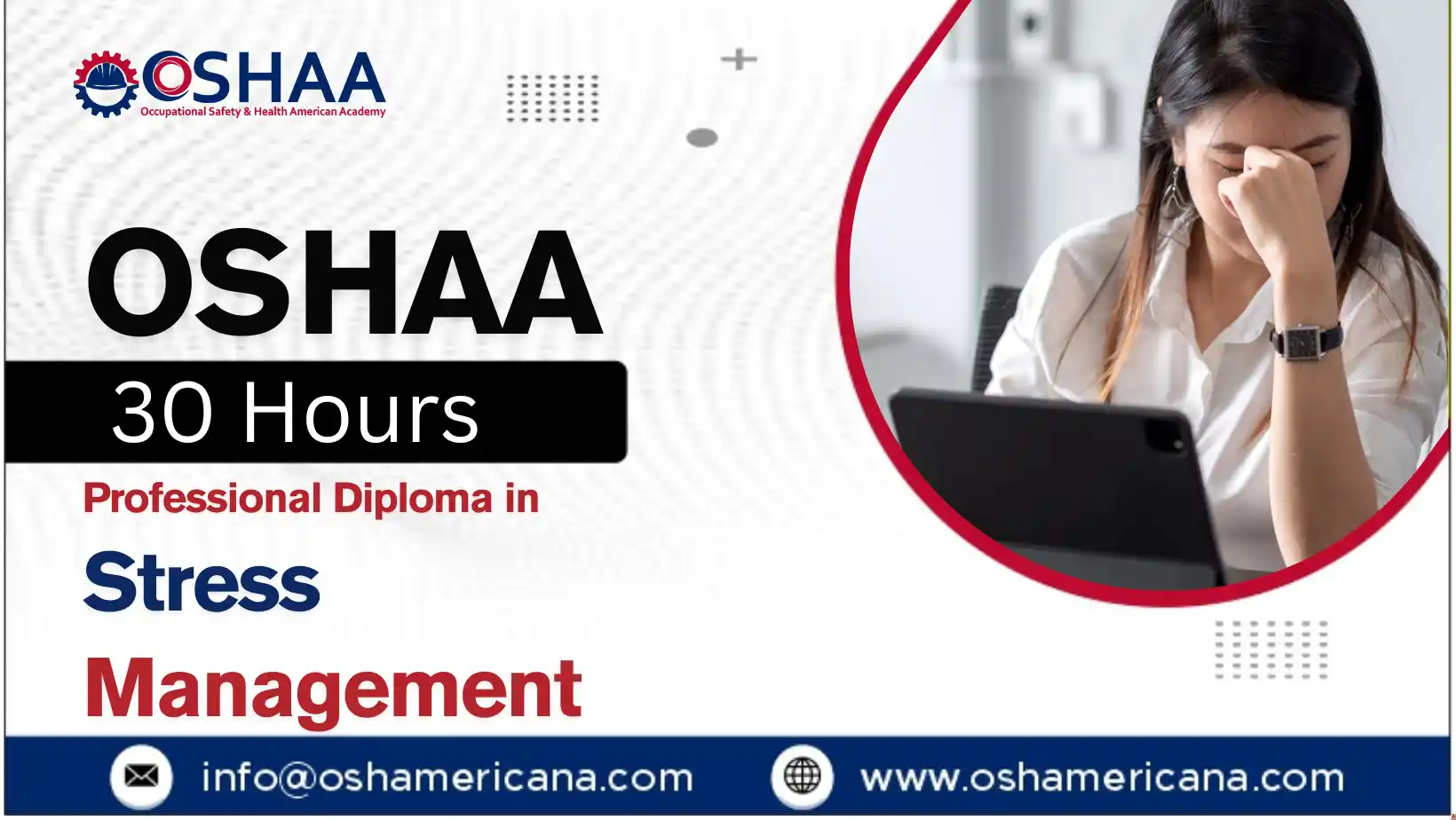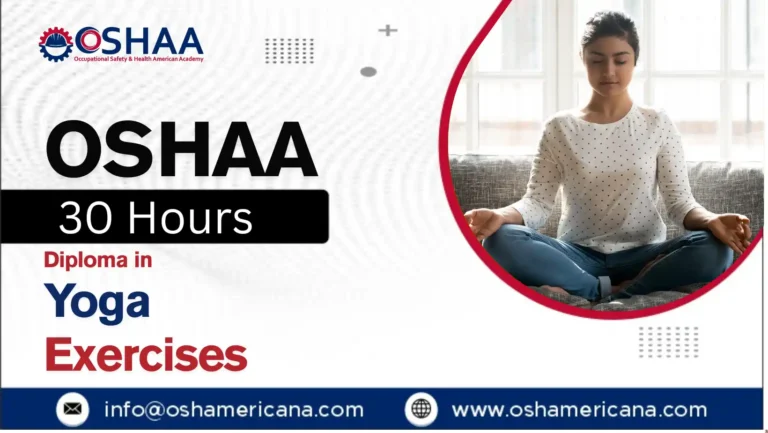Stress is a common challenge in today’s fast-paced world. Whether in the workplace or personal life, stress can affect physical, emotional, and mental well-being. The OSHAA 30-Hours Professional Diploma in Stress Management is designed to equip individuals with the necessary skills and knowledge to manage stress effectively, both personally and professionally. This comprehensive course offers valuable tools and techniques to reduce stress, improve well-being, and enhance productivity.
Stress is often regarded as a negative force, but it can also be a motivating factor in certain situations. However, chronic stress can lead to burnout, anxiety, and various health issues, making it crucial to have effective stress management techniques in place. The OSHAA 30-Hours Professional Diploma in Stress Management focuses on developing a balanced approach to stress, enabling participants to manage it efficiently while maintaining a healthy lifestyle.
The OSHAA 30-Hours Professional Diploma in Stress Management offers a comprehensive approach to stress reduction, providing participants with the knowledge and tools needed to effectively manage stress in various aspects of life. By combining theoretical learning with practical strategies, this course is perfect for anyone looking to improve their well-being, enhance emotional resilience, and increase productivity. With a tailored approach to stress management, participants will be empowered to lead healthier, more balanced lives, both personally and professionally.
Whether you are dealing with stress at work, home, or in everyday life, this diploma will equip you with the skills you need to take control and thrive.
OSHAA 30-Hours Professional Diploma in Stress Management
Study Units
Learning Outcomes
Introduction to Stress and Stress Management (2 hours)
- Understand the concept of stress and its significance in daily life.
- Learn the fundamentals of stress management and its importance for overall well-being.
- Gain insight into different types of stress, including acute, chronic, and episodic stress.
Understanding the Causes and Effects of Stress (4 hours)
- Identify common causes of stress in personal and professional life.
- Explore the impact of stress on mental, emotional, and physical health.
- Learn how to recognise stressors and the signs of stress in yourself and others.
The Physiological and Psychological Impact of Stress (4 hours)
- Understand the physiological changes that occur in the body during stress.
- Learn about the psychological effects of stress, including anxiety and depression.
- Explore the long-term consequences of unmanaged stress on health and productivity.
Coping Mechanisms and Stress Relief Techniques (4 hours)
- Discover various coping mechanisms to manage and reduce stress effectively.
- Learn practical stress relief techniques such as breathing exercises and physical relaxation methods.
- Understand how to implement coping strategies in daily life for optimal stress management.
Time Management and Stress Reduction (4 hours)
- Learn effective time management techniques to reduce stress caused by workload and deadlines.
- Develop skills in prioritisation, task delegation, and goal-setting to enhance productivity.
- Understand how improving time management can help achieve a better work-life balance.
Mindfulness and Relaxation Techniques (4 hours)
- Understand the principles of mindfulness and its role in stress management.
- Learn relaxation techniques such as meditation, progressive muscle relaxation, and guided imagery.
- Develop the ability to practice mindfulness and relaxation to manage stress in real-time.
Developing Emotional Resilience (4 hours)
- Gain insight into emotional resilience and its role in coping with stress.
- Learn techniques to enhance emotional strength and manage difficult situations effectively.
- Develop strategies to bounce back from setbacks and maintain a positive mindset under pressure.
Stress Management in the Workplace (4 hours)
- Understand how stress affects the workplace environment and employee productivity.
- Learn strategies to manage workplace stress for yourself and others.
- Explore how to create a healthier work culture by promoting stress management and well-being.
- Improved Stress Awareness: Gain a comprehensive understanding of stress, its causes, and effects, enabling you to recognise stress in yourself and others and take proactive steps to manage it.
- Practical Stress Management Techniques: Learn evidence-based techniques, including mindfulness, time management, and relaxation methods, to reduce stress and improve overall well-being.
- Enhanced Personal Well-being: Equip yourself with tools to manage stress in both personal and professional settings, leading to improved emotional and physical health.
- Increased Emotional Resilience: Develop emotional resilience to cope with life’s challenges and bounce back from setbacks, enhancing your ability to handle stress effectively.
- Improved Productivity: Learn how to manage your time effectively, reduce workplace stress, and create a balanced approach to your personal and professional responsibilities, ultimately boosting productivity.
- Workplace Stress Reduction: Understand the impact of stress on the workplace and learn how to implement strategies to reduce stress, promote a healthy work culture, and enhance team well-being.
- Personalised Stress Management Plan: Create a tailored plan for managing stress that you can implement in your daily life, improving your long-term stress management strategies.
- Better Mental Health: Discover how to manage the psychological impacts of stress, such as anxiety and depression, leading to improved mental health and overall happiness.
- Career Advancement: This diploma enhances your qualifications, equipping you with the knowledge and skills to manage stress in various environments, making you more competitive in the job market.
- Holistic Approach to Stress: Take a holistic approach to stress management, considering the physiological, psychological, and emotional aspects of stress, leading to more balanced and effective stress reduction strategies.
The OSHAA 30-Hours Professional Diploma in Stress Management is designed for a wide range of professionals and individuals seeking to enhance their ability to manage stress effectively. This course is suitable for:
- Professionals and Managers who experience high levels of stress and wish to learn techniques for managing stress in both their personal and work lives.
- HR Professionals looking to implement stress management strategies within their organisation to improve employee well-being and productivity.
- Healthcare Workers and Caregivers who face high-pressure situations and would benefit from learning how to manage stress and prevent burnout.
- Teachers and Educational Professionals who deal with stressful environments and need effective stress management strategies for both themselves and their students.
- Individuals Experiencing Chronic Stress who want to gain practical tools for managing stress and improving their emotional well-being.
- Aspiring Life Coaches and Counsellors looking to specialise in stress management techniques to help clients cope with stress more effectively.
- Anyone Interested in Personal Development who wants to build emotional resilience, improve mental well-being, and manage stress in their daily life.
- Leaders and Entrepreneurs looking to maintain their productivity and well-being in high-stress environments.
This course is ideal for anyone who wants to understand stress better, reduce its impact, and build resilience in the face of life’s challenges.







